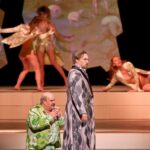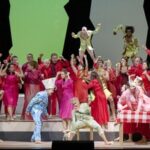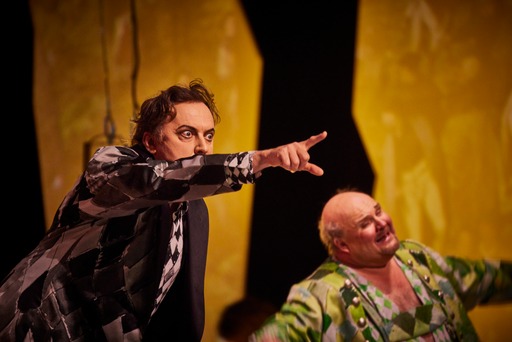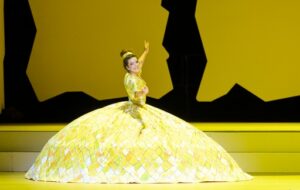Punctuated sounds; a fanfare of staccato trumpets, announcing the end of the world. Gyorgy Ligetti’s music, ever-fascinating, is a rich palette of orchestral sounds. It’s already familiar to us from Kubrick’s (1968) 2001 A Space Odyssey, a breakthrough sci-fi experience, the soundtrack a best-seller, Ligetti’s music integral to the film’s success.
Ligetti’s score for Le Grand Macabre– played by Vienna State Opera Orchestra under Pablo Heras-Casado – depicts a futuristic world, a dystopia. It’s anti-opera, (not against opera), but subverting our expectations. So it’s satirical, outrageous, and lewd, and often the comedy is very funny.
‘O, golden Brueghelland, ancient paradise, where have you gone’, sing Chorus, ironically. Ligetti’s (1974) opera was defined by the 1970’s sexual revolution. So Jan Lauwer’s production opens with exotic dancing, stunningly performed by a troupe of Vienna’s ballet talent. Writhing bodies, in a state of orgasmic ecstasy: this could be a set for Hair, or late 60’s ‘nude’ musicals.
Amando (Isabel Signoret) and Amanda (Maria Nazarova)- outstanding sopranos- vow “We shall perish together in our desire”. Unconventional, same-sex, representing gender without boundaries, ‘I tremble, melt in your hands’, ‘my breast is full of desire’. They sing of a secret place, where no one hears their sighs.
‘NEVER! Die, but not of desire,’ interjects Nekrotzar (Viennese baritone George Nigl.) Nigl appears in a multi-coloured long cloak, in patchwork patterns, like a magician. He orders ‘beer-barrel Piet’ – Gerhard Siegel, rather corpulent- ‘Get back, you fat slob!’ Siegel appeals, take pity: all have mercy on Piet. – SHUT YOUR FACE AND BE GLAD YOU’RE ALIVE, but you’re gonna die’, sings Nekrotzar’s grim-reaper. – (But you spoke of death not punishment?) The ravers on stage are ‘idiot dancing’, like back in the 70s.
‘Today at midnight you will see a white horse, and fire will follow’; APOCALYPSE! thunders Nigl’s Necrotzar.
There are drumbeats aplenty. Could this be a circus of sorts? Piet in a stylised space-age suit, jaquard pattern, sings, Let the children live, the good and the bad. Nigl’s Nekrotzar counters, THE END OF THE WORLD HAS ARRIVED. Meanwhile Amanda (Nazarova) sings of Amando, ‘Your body melts like snow’. Still death is imminent, but these two sublime sopranos cuddle and kiss, interrupted by a fanfare of brass instruments, stabbing trumpets.
In Lauwer’s imaginative sets, space aliens, robots in silver, are manipulated like puppets. Mescalina (Marina Prudenskaya), so you’re escaping your dates? The two kinetic puppets, in shiny black perspex, each like a toy, playthings, could almost have been in ‘Star Wars’ 1977.
Mescalina, Prudenskaya’s blonde, nimble figure, is partying, with suggestive hip movements. ‘Can you hear me Venus?’ Young girls wearing only mens’ shirts, tip-toe on stage. Venus (Sarah Aristidou), in a billowing, wide-hooped satin party dress, asks Mescalina, What did you do with the men? Mescalina replies, I make cuckolds of them. But she admits she’s been victimised a bit!
Cymbals and the siren-like sound of the ondes martenot. Ligetti’s is a soundtrack from another world. Nekrotzar continues his apocalyptic rant, ‘In cold blood, I shall pulverise, vanquishing humanity. I come bringing death!’ He’s the butcher, the tenant from hell. Astradamors (Wolfgang Bankl, veteran Vienna bass), joins in ‘We’re all going to die!‘
 The dancers, semi-nude, half-naked, are now cavorting around in black hoodies. ‘Now let’s hear your final cry!’ Nigl responds with a rendering of Cockl-Doo-Da-Do!, an absurdist outpouring of nonsense semantics.
The dancers, semi-nude, half-naked, are now cavorting around in black hoodies. ‘Now let’s hear your final cry!’ Nigl responds with a rendering of Cockl-Doo-Da-Do!, an absurdist outpouring of nonsense semantics.
The curtain is up. Astradamors, alone front of stage, declares ‘Finally, he’s King in his own house!’ Whatever the serious intent of Ligetti’s opera, with the motley crew on stage, it resembles an apocalyptic pantomime. An alarm clock is ringing, but in distant space?
When I first heard the opening of Act 2, I was surprised, actually shocked, by the strong language. Act 2 is set in the court of Prince Go Go. His ministers are feuding. Ligetti’s opera is in German, but ‘Arschlecher’ is unmistakeable. So White Minister to Black Minister, who responds ‘Toilet bowl’. They banter, ‘Piss drinker’, ‘despicable rat’! Wanker!… Prince Go-Go (Andrew Watts) calls for appeasement- to a drum roll. There’s a chorus of inane laughter, nonsense dialogue. It’s like the ‘Goon Show’ revisited (a favourite of Prince Charles, as then in the 60s.) The Prince Go-Go and Ministers sketch, surreal, could be Ligetti’s send-up of the (Act 2) Chinese ministers in Turandot. Prince Go-go declares I’m hungry, they reply in unison, (Yes, Minister?)
Now xylophone and piano sounds offer a subversive commentary. Prince Go-Go, Watts now in a silk suit, wearing a white plastic crown- like Hans-Christian Anderson’s Emperor- makes wild gestures, imitated by his courtiers. They jump up-and-down,
 Prince, stay with us! Breueghelland -Oh what a hot-tempered Monarch! Venus is back. Aristidou sings on a sustained high note. (How does she do it?)
Prince, stay with us! Breueghelland -Oh what a hot-tempered Monarch! Venus is back. Aristidou sings on a sustained high note. (How does she do it?)
On a twilight-lit stage, eerie violins, a skull revolves. They’re all playing with bony skeletons, like as if toys. Preceded by ceremonial trumpets, Nigl’s Nekrotzar announces the Great Day has arrived. He proclaims the human race will be scrapped. Piet the Pot sings, then let us take provisions from this princely restaurant. Nekrotzar retorts- What with whips and brooms, you’re not in paradise now, you know!
Piet, swigging from a bottle, asks what’s the time. We hear the sound of the gong, a cuckoo. Where is my scythe, trumpet, demands Nekrotzar. ‘What rings now is eternity’, he sings. The gong repeats, echoes. Clashing cymbals. Now soft bass, trombones, horns; an eerie, solemn Chorus sing ‘Consummus est.’ Ligetti’s astonishing, other-worldly music of the heavens, is exploding with tubas.
The wheels of a clock, suspended. Fatso Piet and Astradamors are hanging upside-down. Are you dead, asks Piet. Astradamors, ‘Yes’.- ‘Sincere condolences!’
Is everyone dead? Surveying the empty city, Watts’ Prince Go-Go is looking uncannily like (Atkinson’s) Mr Bean. Who the f*** are you, he asks of Nekrotzar.
The survivors, Amando and Amanda, sing ‘It was good in the dark; in the grave, they were undisturbed.- What does Doomsday concern us?- For us there is no here and now. Death, when he comes, then it’s time. They’ll bid farewell cheerfully.
The costumes (Lot Lemm) are over-detailed, designs verging on kitsch. The sets (Lauwers), with curvey, Matisse-like, cut-out effects, are reminiscent of tacky sci-fi B-movies of the 1960/70’s. But musically, the cast was outstanding; the Chorus, (Vienna State Opera, Slovak Philharmonic), and Vienna’s orchestral players under Casado, exemplary, justifying Ligetti’s genius. © PR 14.11.2023
Photos: Prince Go-Go (Andrew Watts); Sarah Aristidou (Venus/ Chief Gepopo); Andrew Watts and ensemble
© Michael Pöhn/ Wiener Staatsoper


